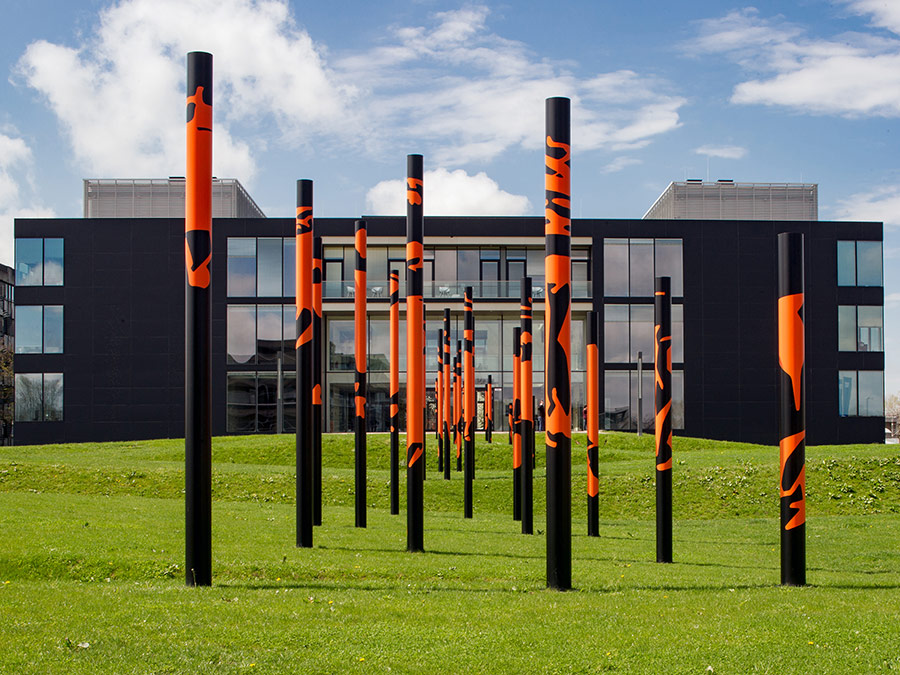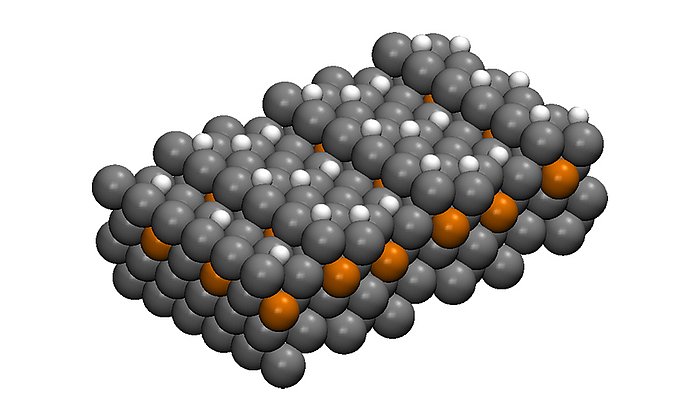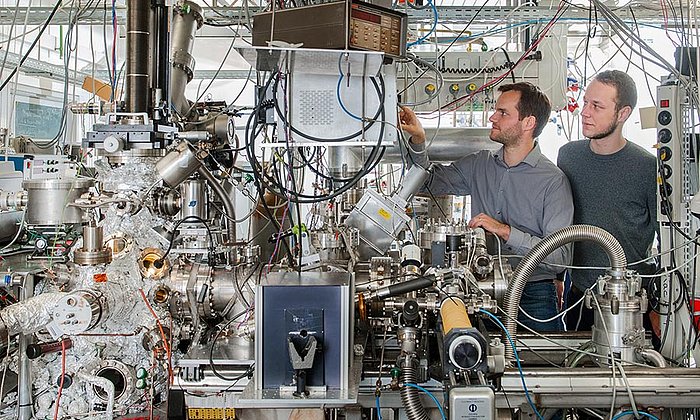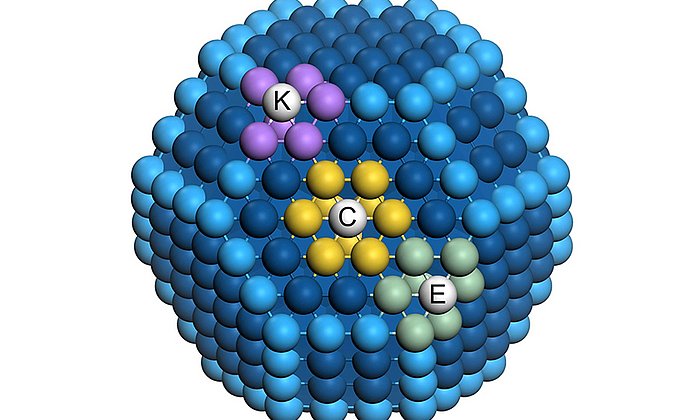New research facility inaugurated in Garching
TUM opens central institute for catalysis research

Catalysts are the key to sustainable, energy and resource conserving chemical conversion of materials. The use of biogenic raw materials in the future, as well as the extraction, storage and conversion of energy depends on advances in applied catalyst research. The global market for catalysts has topped 18 billion euros and continues to grow. Yet, even fundamental problems like the catalytic utilization of natural gas (methane) to produce refined intermediary chemical products remain unsolved.
In its new research facility, the TU Munich will tackle the interdisciplinary challenges of modern catalysis as a systems science, bundling available competency from the Departments of Chemistry and Physics and augmenting them with approaches from engineering, computer science and mathematics.
“In this kind of research, there are no longer borders between the classical disciplines of engineering and natural sciences. Under the shared roof of the Catalysis Research Center we bring widely divergent methodological approaches to convergence,” says TUM President Prof. Wolfgang A. Hermann, who, himself a catalysis researcher, initiated the new research facility. “The product diversity of our technological society will be feasible in the future only if valuable products are produced, excess products decomposed and harmful products avoided through the use of specific catalysts.”
One of a kind research infrastructure
The Catalyst Research Center is tightly linked methodically and thematically with existing campus facilities like the Departments of Chemistry, Physics, Mechanical Engineering, Mathematics, and Computer Science, as well as the research center for white biotechnology and the TUM International Graduate School of Science and Engineering (IGSSE), a result of the Excellence Initiative 2006. This is flanked by the newly founded research center for synthetic biotechnology (supported by the Werner Siemens-Stiftung) and various infrastructure facilities, in particular the research neutron source of the Bavarian NMR Center and the supercomputers of the Leibniz Computing Center.
The center is also home to the strategic research alliance “Munich Catalysis” (MuniCat). In the vein of the “Industry on Campus” concept, TUM scientists work here in collaboration with researchers of Clariant AG to answer important questions in basic and applied research in the field of chemical catalysis. The Wacker Institute of Silicon Technology is a further topically integrated partner in the research program.
New professorships
TUM used the planning and construction phases to establish new catalysis-relevant professorships. It extended the spectrum with professorships of bio-organic chemistry, computer-aided biocatalysis, industrial biocatalysis, technical electrochemistry, physical chemistry/catalysis, silicon chemistry, solid body NMR spectroscopy, biomolecular NMR spectroscopy, selective separation technology and systems biology.
Associated with the CRC are research activities of the Competence Center for Renewable Raw Materials in Straubing where, among other things, ethanol is produced biocatalytically from agricultural products. “The completed expansion of the biochemical and biophysical research facilities at TUM – also with multiple new professorships – strengthens the catalysis focus in the biopharmaceutical domain,” said TUM President Wolfgang A. Hermann. Shortly a new building dedicated to protein research will be erected next to the Catalysis Research Center. “Thus, TUM is now positioned as an international leader with a coherent overall concept.”
Research center with supraregional significance
“Hardly any product of the chemical industry would be economically and ecologically feasible without catalysts. Catalysis research is thus a key technology – especially in a raw material poor country like Germany,” said Stefan Müller, parliamentary state secretary in the German Federal Ministry of Education and Research (BMBF). “The TU München is already doing world-class catalysis research. The new center will bolster this position significantly. The construction, which was supported with funding of almost 29 million euro from the BMBF, will thus make an important contribution to strengthening the research location Germany.”
“With the Departments of Chemistry, Physics, Mechanical Engineering and Computer Science, the TUM neutron research source and the super computers of the Leibniz Computing Center, the research campus Garching has a one of a kind infrastructure worldwide,” said the Bavarian Economic Minister Dr. Ludwig Spaenle. “With the new Catalysis Research Center we have now created a site at which the existing synergies can converge and become effective. We are strengthening the international competitiveness of the scientific and economic regions of Bavaria and Germany with the new Catalysis Research Center.”
Cutting-edge research with a global network – Honorary doctorate titles for catalysis researchers
In the context of the festivities, the Technical University of Munich awarded the chemists Prof. Ferdi Schüth and Prof. Tobin Marks honorary doctorates. Ferdi Schüth, Director at the Max Planck Society for Coal Research in Mühlheim/Germany and Vice President of the Max Planck Society was honored for his scientific work on heterogeneous catalysis. In particular, he developed a high throughput process to test many catalyst variants in parallel, which reduces the development cycles of new catalysts significantly.
With over 1200 scientific publications and more than 200 patents, Tobin Marks from the Northwestern University in Illinois/USA is among the leading researchers worldwide in the field of organometallic chemistry, which has been a research domain of TUM for many years as well and has received much impetus here. His research results have enabled key developments in industrial applications. Marks has previously been distinguished with the Wilhelm-Manchot Prize of the Chemistry Department and is also a TUM Distinguished Affiliated Professor.
The rows of honorary doctorates include research personalities that have made pioneering contributions to catalysis research, such as Prof. Henri Brunner (Regensburg, Germany) and Prof. Jean-Marie Basset (KAUST, Thuwal/Saudi Arabia), as well as the Nobel Prize laureate Prof. Karl B. Sharpless (La Jolla, USA) and Prof. Gerhard Ertl (Berlin, Germany).
In the context of the ceremony, TUM-President Prof. Wolfgang A. Hermann awarded the TUM alumnus Dr. Christian W. Kohlpaintner, Clariant AG Board member, the Karl Max von Bauernfeind Medal. He received the honor for his outstanding commitment to the charitable TUM University Foundation, of which he is a founding member and chairman of the foundation board.
Address: Ernst Otto Fischer-Str. 1
The street address of new building is Ernst Otto Fischer-Str. 1. Fischer (1918 – 2007) pioneered in organometallic chemistry and was awarded the Nobel Prize in Chemistry in 1973. He held the Chair of Inorganic Chemistry at TUM from 1964 to 1984.
Technical University of Munich
Corporate Communications Center
- Dr. Andreas Battenberg
- battenberg@zv.tum.de
- presse@tum.de
- Teamwebsite


